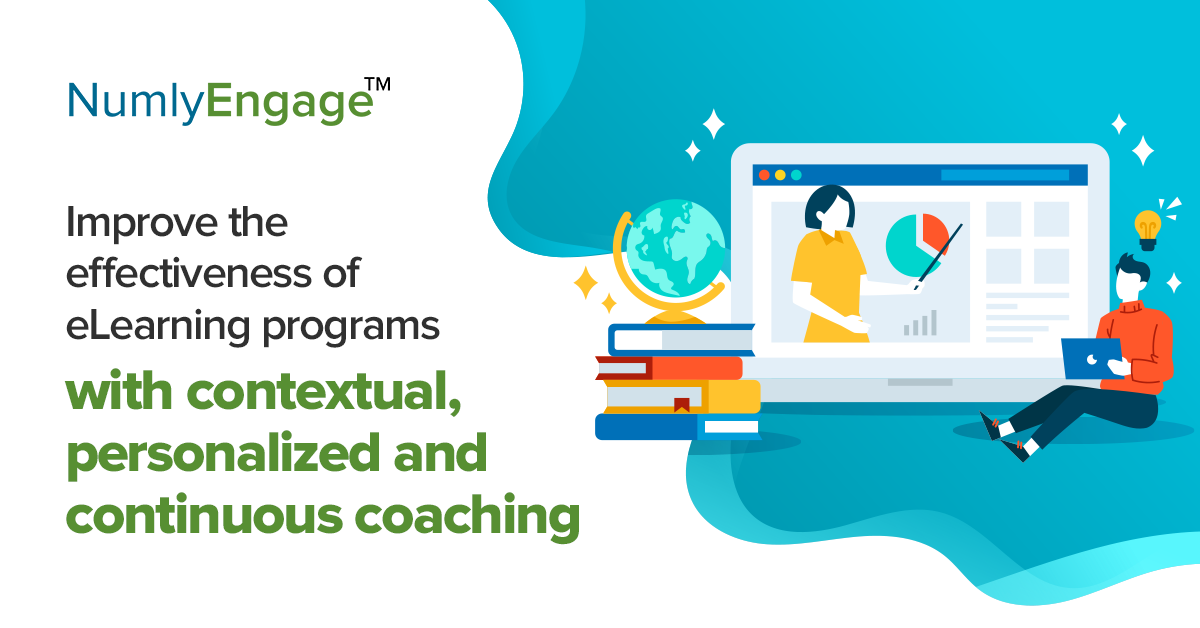eLearning is not a new term for the enterprise. Most organizations have robust eLearning initiatives in place to meet their reskilling and upskilling needs. Over the years, online training has established itself as a viable and reliable alternative to classroom training – one that has been effective both from the cost and time perspective.
As we move into a post COVID world where remote working and distributed teams are the new normal, organizations are looking to ramp up their eLearning initiatives to keep the wheels turning on their training and development initiatives.
Reports show that comprehensive training programs lead to 218% higher revenue per employee than organizations without formal training programs.
Robust training and development initiatives also contribute significantly to employee engagement, especially as the millennials become the dominant demographic in the workplace.
Read: The New Normal in Employee Engagement – Power Up your People
However, when it comes to eLearning, even training programs built by experts are designed to satisfy general needs. People attending these training also have to have the right motivation to complete the training successfully and implement the learning in their daily activities.
While eLearning works (the eLearning market is projected to be worth $325 billion by 2025) and learning retention rates are said to increase between 25 percent and 60 percent over time because of eLearning, there is an opportunity to power it up as well – with coaching.
Coaching and eLearning – A match made in heaven
Millennials and digital natives, the demographic that makes up most of today’s workforce, are motivated by personal and professional development initiatives. However, just any run-of-the-mill training program will not make the cut.
Here’s a look at how coaching can be the ideal companion of eLearning to deliver exemplary results.
Develop the context
eLearning programs are goal-driven. At the end of the modules, participating individuals should be able to achieve ‘X’ results or be able to do ‘Y’ things. While the modules are comprehensive enough to achieve this, employees often do not implement the learning in their work because the context is missing for them.
Complementing coaching with eLearning helps the employee understand the context. A coach can guide an employee through the maze of context and help them see the training’s relevance. A coach can also recommend contextual eLearning initiatives for the employees to help them navigate the career path with greater confidence.
Personalization matters
Today is the age of hyper-personalization, and coaching can make eLearning truly personalized – extending it beyond the ‘name’ personalization.
Using technologies such as AI, organizations can find the correct Coach-employee pairing. The coach can then guide the employee on how to progress along their career path and navigate the challenges that emerge. During this course, the coach helps them identify areas they need help and push them to select tailored training programs to meet their exact needs.
AI can also be used to provide personalized and contextual nurturing actions that include delivering personalized notifications, reminders, alerts, commendations, and more. Such activities make online interactions more engaging and motivating.
A robust coaching platform will connect the right coach to the right employee and also deliver AI-driven nudges to address individual skill gaps and identify unique learning processes. Such high levels of personalization also help in driving better engagement since there is a tangible impact of the training on the employee’s career path.
Coaching enables continuous learning
Technology-driven coaching platforms also allow enterprises to supercharge their eLearning initiatives by driving continuous learning.
Unlike a regular training program, where the information disseminated is often lost once the initial enthusiasm wears off, coaching helps to keep the momentum going. Coaching helps employees identify their needs and skills gaps more proactively as well.
For example, developers and coders have to now learn new technologies faster as the shelf-life of technologies is reducing. A coach can help such employees identify which skills they should proactively learn, how these skills will help them, and what other skill sets they need to develop to move further along their professional paths. Learning, then becomes part of the organizational culture, and the implementation of the learning by employees becomes organic since coaching enables behavioral change.
Deep engagement analytics provide transformational insights into the efficacy of these development initiatives and help organizations tailor-make coaching and eLearning programs to meet the shifting needs of today’s enterprise.
By proactively identifying the skill needs of the workforce, organizations can navigate today’s complex business landscape faster, increase their capacity to innovate, and at the same time, have a workforce that is highly motivated and deeply engaged.
If you want to improve the outcomes of eLearning initiatives, you may want to think about offering coaching initiatives to your employees.
Connect with us to learn how to seamlessly connect the two.

